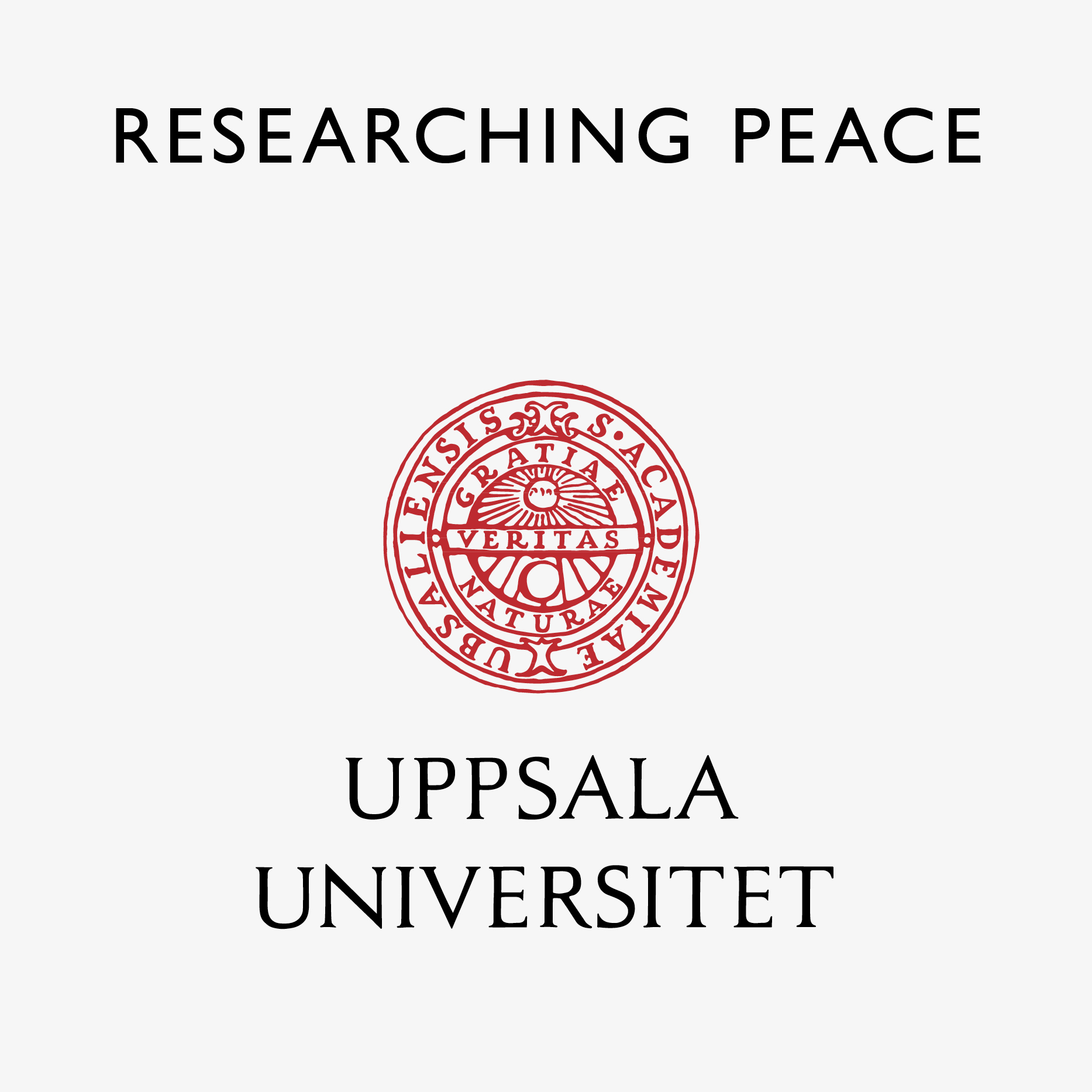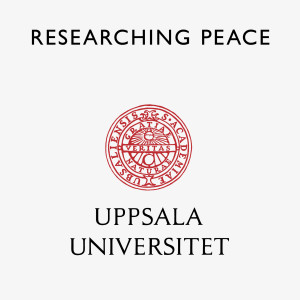

17.2K
Downloads
73
Episodes
Why do armed conflicts happen? How can we achieve lasting peace? In the Researching Peace podcast, you will meet the leading researchers in peace and conflict research and other experts in the field. Researching Peace is produced by the Department of Peace and Conflict Research at Uppsala University. Some episodes are produced in collaboration with the Alva Myrdal Centre for Nuclear Disarmament and focus on issues of nuclear disarmament and non-proliferation. The views expressed in the podcast are those of each contributor and do not represent the official position of either the University or the Department. More about us Department of Peace and Conflict Research - Uppsala University
Episodes

Tuesday Nov 04, 2025
#42 Evolving Threats to Nuclear Security – with Lars van Dassen
Tuesday Nov 04, 2025
Tuesday Nov 04, 2025
What are the most acute threats to nuclear security and how are they evolving? How does nuclear security relate to non-proliferation and disarmament? In this episode we talk to Lars van Dassen, who is executive director of the World Institute for Nuclear Security (WINS) in Vienna.
This episode is presented in collaboration with the Alva Myrdal Centre for nuclear disarmament.

Friday Sep 19, 2025
#41 The Iranian Nuclear Issue – with Stephan Klement
Friday Sep 19, 2025
Friday Sep 19, 2025
In this episode we discuss the Iranian nuclear issue with Ambassador Stephan Klement, who is the EU Special Envoy for Disarmament and Non-Proliferation.
He has been a part of the nuclear negotiations with Iran for more than 20 years and is a Special Advisor for the Iranian nuclear issue in the European External Action Service.
Since Stephan holds two doctoral degrees, in International Law and in Physics, we also zoom in on the interdisciplinary aspect.
This episode is produced in co-operation with the Alva Myrdal Centre for nuclear disarmament: uu.se/amc

Monday Aug 25, 2025
#40 A Journey Connecting Mental Health and Peace – with Karen Brounéus
Monday Aug 25, 2025
Monday Aug 25, 2025
In this episode, Karen Brounéus, professor in peace and conflict research and clinical psychologist, takes us on a journey from grassroots work to the bird's-eye view of research and policy and back again. Karen’s research helps us think more deeply about the intrinsic link between mental health and conflict reduction.
Her new Uppsala Initiative for Global Mental Health and Peace includes a project in Tigray, Ethiopia, developing an evidence-based approach to treat post-war depression, and a project with Mindfulness-based stress reduction in Sweden.
#Research #MentalHealth #PeaceAndConflict

Tuesday Jun 17, 2025
#39 The Challenge and Potential of Conflict Data – with Therese Pettersson
Tuesday Jun 17, 2025
Tuesday Jun 17, 2025
In this episode UCDP Research coordinator Therese Pettersson discusses their newly released data for the year 2024. She also walks us through how the Uppsala Conflict Data Program ensures the quality of the datasets and how they tacke key challenges in data collection.
Further resources:
A special data feature in which the UCDP team discusses the data is available open access on the Journal of Peace Research website.
We also recommend the latest episode of PRIO's Peace in a Pod, which asks what the rise in global conflict means for children in the affected areas.

Friday May 23, 2025
#38 AI, Peace and International Law – with Mary Ellen O’Connell
Friday May 23, 2025
Friday May 23, 2025
This special episode features the talk by Professor Mary Ellen O’Connell from the Kroc Institute for International Peace Studies, which she gave at the inaugural Peter Wallensteen Lecture on 20 May 2025 in Uppsala. This new lecture series honours our founder Professor Peter Wallensteen.
The talk begins with a critique of the current reliance on deterrence theory. Professor O’Connell then proceeds to argue how AI research and state funds should be reoriented from deterrence towards self-defence based on the principles of international law. We found the talk thought-provoking and hope you too will find it stimulating!
Mary Ellen O’Connell is the Robert and Marion Short Professor of Law and Professor of International Peace Studies—Kroc Institute for International Peace Studies at the University of Notre Dame, USA. Her work is in the areas of international law on the use of force, international dispute resolution, and international legal theory. Her current work is on AI in the military domain.

Tuesday May 06, 2025
#37 A Challenged but Unbroken Nuclear Order – with Stephen Herzog
Tuesday May 06, 2025
Tuesday May 06, 2025
After several decades of relative stability, many now question the health of the global nuclear order. In this episode, Dr. Stephen Herzog offers his take on the impact of the Russian war in Ukraine, the rise of China, and recent shifts in US foreign policy under Trump. Is the nuclear taboo eroding? Will more countries acquire nuclear weapons? Are key non-proliferation and disarmament treaties under threat? Stephen has done extensive research on these topics and published many influential papers. In fact, we were so impressed with his thorough, innovative, and surprisingly optimistic analysis that we decided to make this an extended episode!
Dr. Stephen Herzog is Professor of the Practice at the James Martin Center for Nonproliferation Studies, based at the Middlebury Institute of International Studies at Monterey. He is the Academic Co-Chair of the Harvard-MacArthur Foundation Beyond Nuclear Deterrence Working Group. Professor Herzog has been involved with the Alva Myrdal Centre's Working Group 1 on Nuclear Negotiations since it began and is a frequent guest lecturer for the AMC's academic programming for students at Uppsala University. He has published widely in scholarly and policy journals and holds a PhD In Political Science from Yale University. Before returning to academia, Dr. Herzog was a nuclear arms control official working for the US Department of Energy.
This episode is produced in cooperation with the Alva Myrdal Centre for Nuclear Disarmament. It is hosted by Communications Officer Joakim Palmén.
--
Here are some of Stephen’s publications, which also served as background for the episode:
This article offers a broad discussion of the Russo-Ukrainian War's implications for the global nuclear order: https://doi.org/10.1080/00396338.2022.2103255
This chapter assesses how Russia's war on Ukraine will affect prospects for nuclear disarmament and the Treaty on the Prohibition of Nuclear Weapons (TPNW): https://www.amacad.org/publication/altered-nuclear-order-wake-russia-ukraine-war/section/2
This article describes the role that China could play in helping to stabilize the global nuclear order: https://doi.org/10.1080/10402659.2024.2401058

Thursday Apr 03, 2025
#36 The Joys of Data and the Utility of Visuals – with Siri Jansson
Thursday Apr 03, 2025
Thursday Apr 03, 2025
In this episode Siri Jansson discusses the joys and challenges of creating the Alva Myrdal Centre’s new database on arms control agreements, AMC data. Siri offers fascinating insights on how visuals have been an integral part of the project since its inception. We also get a sneak peek of what’s next for the AMC Data team! Check out AMC Data: https://amcdata.uu.se/en

Tuesday Mar 04, 2025
#35 Bridging Research and Policy – with Florian Krampe
Tuesday Mar 04, 2025
Tuesday Mar 04, 2025
In this episode we discuss the link between science and policy with Florian Krampe, who works as Director of Studies, Peace and Development at the Stockholm International Peace Research Institute (SIPRI.) Florian has rich experience working at the interface between science and policy and offers valuable perspectives and examples of how successfully bridging the gap between researchers and policymakers can lead to better outcomes.
This episode is hosted by Stefan Döring, who is a researcher at our department.
For more information on the Geneva Water Hub, please see https://www.genevawaterhub.org/
Links to work mentioned in this episode:
1) International Affairs article: https://doi.org/10.1093/ia/iiae057,
2) Sipri Fact sheets on climate security: https://www.sipri.org/research/peace-and-development/climate-change-and-risk/climate-related-peace-and-security-risks/recent-pubs
3) Recent article in Environmental Politics: https://doi.org/10.1080/09644016.2022.2156174,
4) Environment of Peace Report: https://doi.org/10.55163/LCLS7037.

Tuesday Feb 18, 2025
#34 Democracy Under Threat – with Espen Geelmuyden Rød
Tuesday Feb 18, 2025
Tuesday Feb 18, 2025
In this episode we look at current threats to democracy and ask if the internet and social media have turned against democracy? Joining us from Norway is Espen Geelmuyden Rød, who is a former researcher at our department. Espen has done research on the social and political causes of autocracy and democracy as well as the political impacts of digital information and communications technology.
Sources mentioned:
The Struggle for Trust Online | Freedom House
Study on US democracy/oligarchy: Testing Theories of American Politics: Elites, Interest Groups, and Average Citizens | Perspectives on Politics | Cambridge Core
Sample of Espen’s Research:
Empowering activists or autocrats? The Internet in authoritarian regimes
Espen Geelmuyden Rød and Nils B Weidmann
https://journals.sagepub.com/doi/abs/10.1177/0022343314555782
The Internet and Political Protest in Autocracies
Nils B. Weidmann and Espen Geelmuyden Rød
https://academic.oup.com/book/34978
The determinants of democracy: a sensitivity analysis
Espen Geelmuyden Rød, Carl Henrik Knutsen and Håvard Hegre
https://link.springer.com/article/10.1007/s11127-019-00742-z?te=1&nl=the-interpreter&emc=edit_int_20191111

Monday Jan 27, 2025
#33 The Civil War in Sudan – with Johan Brosché
Monday Jan 27, 2025
Monday Jan 27, 2025
In this episode, Johan Brosché helps us navigate the complexities and horrors of the civil war currently raging in Sudan. Johan works as associate professor at our department and is one of Sweden’s leading experts on Sudan.
A quick glance at Johan’s CV reveals his academic interest in Sudan, but during our conversation his engagement and empathy for the people of Sudan also became apparent.
During our conversation Johan shared memories from Sudan and recent reports from contacts on the ground, while offering valuable insights into the conflict , paths towards de-escalation and why the war is underreported in Western media.
This episode is hosted by Joakim Palmén, Communications Officer at the Department of Peace and Conflict Research.